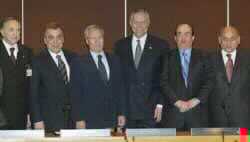A committee of Arab foreign ministers scheduled to meet with Iraqi President Saddam Hussein in the next few days will not ask him to step down from power in order to avoid a US attack, Egypt's Information Minister Safwat al-Sherif said. The committee was created after the Arab League summit in Sharm el-Sheikh on March 1 with the goal of presenting a unified Arab position of opposition to a military attack on Iraq.
It comprises the foreign ministers of Bahrain, Egypt, Lebanon, Tunisia and Syria, as well as Arab League secretary general Amr Mussa.
"The committee is charged with explaining the situation to Iraq, asking it to cooperate more with the inspectors and not give pretexts that can be exploited," said al-Sherif.
The committee will be in Baghdad on Friday and is expected to meet with Saddam Hussein on Saturday, an Arab League official told the state news agency MENA.
Other Key Developments Concerning Iraq
*_ Facing almost certain defeat in the Security Council, the United States and Britain signaled they would extend for a short period a deadline for Saddam Hussein to disarm or face war. The White House insisted that the resolution would be put to a vote this week but said a proposal being floated to push back the March 17 deadline by a month was "a non-starter."
*_ France said it was "open to dialogue" but will not budge on the fundamentals it has championed since the start of the crisis.
*_ Iraqi fighter jets threatened two American U-2 surveillance planes, forcing them to abort their mission and return to base, U.S. officials said. A Pentagon official said the decision to end the mission was made "in the interest of safety." Iraq said the U.N. had apologized for the incident and called it a "technical mistake."
*_ The Pentagon's No. 2 official, Paul Wolfowitz, said that if President Bush decides to invade Iraq, it will be a "war of liberation" as well as an effort to rid Iraq of weapons banned by the United Nations.
*_ The Pentagon said the Air Force tested for the first time the biggest conventional bomb in the U.S. military's arsenal, a 21,000-pound munitions that could play a dramatic role in an attack on Iraq.
*_ Pakistan, one of 10 non-permanent members of the U.N. Security Council, said it will abstain from voting on a U.S.-backed resolution approving war with Iraq.
*_ Japan has been lobbying undecided Security Council members to urge support for the U.S.-backed resolution. In one call, Prime Minister Junichiro Koizumi told Mexican President Vicente Fox that international divisions were putting the United Nations' authority at stake, the Japanese Foreign Ministry said.
*_ Recep Tayyip Erdogan, the leader of Turkey's governing party, was named prime minister, a step that probably boosts chances the United States will get permission to deploy troops in the country along Iraq's northern border.
*_ Polls showed Bush's approval rating has dropped into the low to mid-50s while two-thirds support military action against Iraq. About the same percentage say U.N. support is desirable but not necessary if the United States has the support of other countries like Australia, Britain and Spain.
*_ A top Australian intelligence adviser resigned to protest the Prime Minister John Howard's hardline policy on Iraq.
PHOTO CAPTION
Secretary of State Colin Powell poses for a photo with some of the Arab foreign ministers before commencing a meeting to discuss Iraq at the United Nations, Friday, March 7, 2003. Pictured from left are, Habib Ben Yahia of Tunisia, Mahmoud Hammoud of Lebanon, Farouk al-Shara of Syria, Secretary of State Colin Powell, Shaikh Muhammed bin Mubarak Al-Khalifa of Bahrain, second from right, and Ahmed Maher from Egypt, far right. (AP Photo/Stua
- Author:
& News Agencies - Section:
WORLD HEADLINES


 Home
Home Discover Islam
Discover Islam Quran Recitations
Quran Recitations Lectures
Lectures
 Fatwa
Fatwa Articles
Articles Fiqh
Fiqh E-Books
E-Books Boys & Girls
Boys & Girls  Articles
Articles










